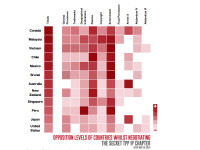The Internet Association, a U.S.-based industry association that counts most of the biggest names in the Internet economy as its members (including Google, Amazon, eBay, Facebook, Netflix, and Yahoo), recently released a policy paper on how Canada could become more competitive in the digital economy. The report’s recommendations on tax reform generated some attention, but buried within the 27-page report was a call for patent reform.
The Internet giants warned against patent trolling, which refers to instances when companies that had no involvement in the creation or invention of a patent demand licences or other payments from legitimate companies by relying on dubious patents. Studies indicate that patent trolling has a negative impact on economic growth and innovation and is a particularly big problem in the U.S., which tends to be more litigious than Canada.
Given those concerns, the Internet Association urged the Canadian government to enact reforms to “limit the ability of non-practicing entities [a euphemism for patent trolls] of exploiting patents to make unreasonable demands of productive companies and prevent crippling damage awards.”
While the Canadian government has yet to respond publicly to the recommendations, my weekly technology law column (Toronto Star version, homepage version) reports that according to documents recently obtained under the Access to Information Act, earlier this year Industry Minister James Moore launched a series of private consultations with Canadian business on intellectual property issues. The government came prepared to engage directly on the patent trolling issue, going so far as to identify several potential policy measures. Yet it was Canadian business that discouraged Moore from taking action, warning against the “unintended consequences” of patent reforms.
Read more ›










